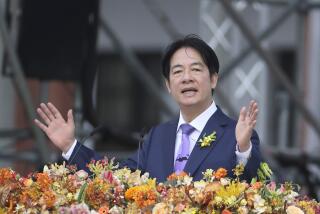Latest China War Games May Not Be Last Step
TAIPEI, Taiwan — The military exercises China is conducting this week may not be the last step in Beijing’s pressure campaign against Taiwan, according to top officials and scholars here.
Experts sketch out two scenarios in which China could ratchet up the military pressure still further.
One would be the seizure of one of the many small islands now held by Taiwan just off China’s coastline. The other would be for Beijing to conduct a series of new exercises over the coming months in an effort to bring Taiwan to the negotiating table.
Chinese leaders “need to come up with something to satisfy their objectives,” said a worried Andrew Yang, secretary-general of the Chinese Council of Advanced Policy Studies, a Taiwanese think tank that specializes in defense issues. “[Chinese President] Jiang Zemin does not want to come out of this empty-handed.”
The immediate focus in Taiwan is on the island scenario. In the exercises this week, Chinese troops are supposed to practice amphibious landings on the Chinese island of Haitan, just off the coast of Fujian province.
The tiny island of Wuchiu, held by Taiwan, is only about 30 miles to the southwest, and officials and analysts in Taiwan concede that it would be a relatively simple affair, in military terms, for Chinese troops to seize the islet.
One of Taiwan’s main newspapers, the China Times, reported Monday that Taiwanese troops had taken up positions on Wuchiu to defend against a possible beach assault by mainland forces. Military officials refused to comment on the report.
“If they want to release their anger against us [Taiwan] just to humiliate us, they may take an island or islet,” asserted Yu-ming Shaw, director of Taiwan’s Institute of International Relations.
The islands held by Taiwan off China’s coastline include Quemoy and Matsu, which were the centerpieces of hostilities in the Taiwan Strait in the 1950s.
Taiwan’s offshore islands are not covered by the Taiwan Relations Act, the U.S. law that requires the United States to take unspecified action in response to any Chinese military actions against Taiwan.
In fact, throughout the 1950s, the United States tried to persuade Generalissimo Chiang Kai-shek to abandon the offshore islands, on grounds that they were virtually impossible to defend against Chinese attack. Chiang refused to do so, because he saw the islands as a steppingstone toward regaining control of the Chinese mainland.
One defense official in Taiwan said in an interview Monday that it is conceivable China will attack a small island such as Wuchiu, seize it and then move away from it, just to send a signal to Taiwan of Beijing’s military capabilities.
He pointed out that this scenario would be similar to the one China followed in early 1979, when it attacked Vietnam and then, after suffering significant casualties, retreated from the territory it had taken.
But some officials here believe that China will not try to take an island because of the high political cost of doing so. The Taiwanese defense official, who spoke on condition of anonymity, said that if China used force, it would suffer significant damage to its relations with the United States, Japan and Southeast Asia.
The other way China could increase the pressure on Taiwan would be to schedule still more exercises after the current round is supposed to end Monday.
Taiwan’s elections will be held Saturday. The inauguration of the first popularly elected president will take place May 20. From March to May, China could conduct at least a few more rounds of exercises.
That would not only put Taiwan under psychological strain but also further damage the economy, which is already suffering because of the tensions in the Taiwan Strait.
The crisis “is really brutal to our trade, to investment and to economic growth,” said a senior policy advisor to Taiwanese President Lee Teng-hui who asked not to be identified.
Taiwan has already had to spend billions of dollars in foreign-exchange reserves to stabilize prices on its stock exchange and preserve the value of its currency, the new Taiwan dollar. A prolonged series of exercises would raise questions about how long the government can keep intervening in these markets.
And it would bring other economic problems as well--a labor shortage, for example. Taiwan depends to some extent on workers from Southeast Asian countries such as the Philippines and Thailand. These workers might stop coming to Taiwan or begin leaving the island for home if the tensions continue.
Amid these difficulties, Taiwanese officials are already preparing a series of measures aimed at trying to improve relations with China after the election is over. For example, the policy advisor to Lee said that after the election, Taiwan may slowly scale back its campaign for U.N. membership, which has been especially galling to the Beijing leadership.
“To be practical, don’t expect the [Taiwanese] government to give up the campaign all at once,” the advisor said. “But we will probably do less. The government will say less [about the United Nations] and concentrate on developing bilateral relations with China. . . .”
“The Chinese have achieved some of their objectives,” he added. “We got the message.”
More to Read
Sign up for Essential California
The most important California stories and recommendations in your inbox every morning.
You may occasionally receive promotional content from the Los Angeles Times.









